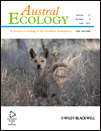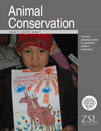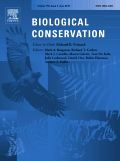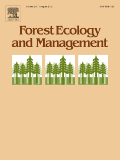
AUSTRAL ECOLOGY
Scope & Guideline
Exploring the intricate dynamics of our ecosystems.
Introduction
Aims and Scopes
- Ecological Dynamics and Interactions:
The journal explores interactions among species within ecosystems, including predator-prey relationships, mutualisms, and competition, providing insights into community dynamics and ecological balances. - Conservation Ecology:
Research published in the journal often addresses conservation challenges, focusing on threatened species, habitat loss, and restoration efforts, with an emphasis on practical solutions for biodiversity preservation. - Climate Change Impact Studies:
AUSTRAL ECOLOGY publishes work that investigates the effects of climate change on ecosystems, species distributions, and community structures, highlighting the urgency of understanding ecological responses to global environmental changes. - Functional and Trait-Based Ecology:
The journal emphasizes studies that utilize functional traits to understand species roles within ecosystems, enhancing knowledge of biodiversity and ecosystem functioning. - Citizen Science and Community Engagement:
Research involving citizen science initiatives is encouraged, reflecting the journal's commitment to involving local communities in ecological research and conservation efforts.
Trending and Emerging
- Ecosystem Resilience and Recovery:
There is an increasing focus on studies investigating ecosystem resilience, particularly following disturbances such as wildfires and climate events, showcasing how ecosystems recover and adapt. - Urban Ecology and Human-Wildlife Interactions:
Research examining the dynamics of wildlife in urban settings is on the rise, addressing the complexities of human-wildlife interactions and the ecological implications of urbanization. - Climate Adaptation Strategies:
Emerging research on adaptive management strategies to mitigate climate change impacts on biodiversity is becoming prevalent, indicating a proactive approach to conservation. - Biodiversity and Ecosystem Services:
There is a growing emphasis on understanding the relationship between biodiversity and ecosystem services, highlighting the importance of maintaining ecological health for societal benefits. - Integrative and Interdisciplinary Approaches:
The journal is increasingly publishing studies that integrate multiple disciplines, combining ecological, social, and economic perspectives to tackle complex environmental issues.
Declining or Waning
- Traditional Taxonomic Studies:
Research focused solely on traditional taxonomic classifications has decreased as there is a growing emphasis on functional traits and ecological interactions rather than merely documenting species. - Local Case Studies with Limited Applicability:
There appears to be a decline in studies that focus on localized ecological phenomena without broader implications, as researchers are increasingly looking for findings that can be generalized across regions or ecosystems. - Invasive Species Research:
Although still relevant, the frequency of papers specifically addressing invasive species management has diminished, possibly due to a shift towards broader ecological impacts and conservation strategies. - Historical Ecology:
Research with a primary focus on historical ecological conditions and their implications has become less prominent, as current studies tend to prioritize contemporary ecological challenges.
Similar Journals

PACIFIC CONSERVATION BIOLOGY
Advancing ecological insights for the Pacific's unique biodiversity.PACIFIC CONSERVATION BIOLOGY is an esteemed academic journal published by CSIRO PUBLISHING, dedicated to advancing research in the fields of ecology and nature conservation. With a strong focus on the unique challenges and biodiversity of the Pacific region, this journal serves as a crucial platform for researchers, conservationists, and students alike to disseminate high-quality, impactful findings. Operating from Australia, it has become a significant resource since its inception in 1993, navigating through nearly three decades of vital scholarly communication. Ranked in the Q2 category for both Ecology and Nature and Landscape Conservation as of 2023, PACIFIC CONSERVATION BIOLOGY maintains rigorous standards, as reflected in its successful Scopus rankings. The journal plays a pivotal role in addressing pressing ecological issues and fostering innovative conservation strategies, making it an essential reference for anyone involved in environmental science. Access options for the journal facilitate widespread distribution of knowledge, supporting the mission to promote informed decision-making in conservation practices.

ECOLOGY LETTERS
Unveiling the intricacies of nature through rigorous research.ECOLOGY LETTERS, published by Wiley, is a premier journal dedicated to advancing the field of ecology and related disciplines. Renowned for its rigorous peer-review process and impactful research contributions, the journal boasts an impressive Scopus Rank of #13 out of 721 in the category of Agricultural and Biological Sciences, positioning it in the 98th percentile globally. With a Q1 rating in the 2023 quartile rankings for Ecology, Evolution, Behavior and Systematics, it serves as an essential platform for ecologists and evolutionary biologists to disseminate cutting-edge research findings from 1998 to 2024. Although not an open-access journal, ECOLOGY LETTERS actively contributes to the global ecology discourse, making it a critical resource for researchers, professionals, and students dedicated to understanding complex ecological interactions and evolutionary processes.

GAYANA BOTANICA
Fostering dialogue in the heart of plant science.GAYANA BOTANICA is a prominent academic journal that specializes in the fields of Ecology, Horticulture, and Plant Science, published by EDICIONES UNIV, CONCEPCION in Chile. Established in 1981, this journal has become a vital resource for researchers and professionals seeking to advance their knowledge and contribute to the understanding of botanical sciences, offering a diverse range of articles that explore the ecology of plants, horticultural practices, and innovative plant science methodologies. Although it currently holds a Q4 quartile ranking in its categories, the journal’s commitment to disseminating valuable scientific findings continues to strengthen its relevance in the field. With its focus on promoting original research and fostering dialogue among scholars, GAYANA BOTANICA plays an essential role in supporting the global scientific community. We invite researchers, academics, and students to engage with its content and explore advancements that are shaping the future of plant sciences.

ANIMAL CONSERVATION
Uniting Voices for Global Conservation Efforts.Animal Conservation is a prestigious journal that serves as a vital platform for the dissemination of research dedicated to the preservation of wildlife and habitats. Published by Wiley, this journal has established a significant presence in the fields of Ecology and Nature and Landscape Conservation, holding a distinguished Q1 category ranking for both in 2023. With an impressive Scopus rank of #25 in the realm of environmental science, it caters to a global audience keen on understanding and addressing pressing conservation issues. The journal provides researchers, professionals, and students with high-quality, peer-reviewed articles that explore innovative methods and strategies in animal conservation. With its continuous publication since 1998, encompassing a comprehensive range of topics, Animal Conservation is indispensable for anyone aiming to make impactful contributions to the field of ecology and conservation biology.

FRAGMENTA ENTOMOLOGICA
Illuminating the ecological roles of insects.FRAGMENTA ENTOMOLOGICA is a prominent peer-reviewed academic journal published by UNIV DEGLI STUDI DI ROMA LA SAPIENZA, focusing on various dimensions of entomology and insect science. With an ISSN of 0429-288X and an E-ISSN of 2284-4880, this journal has embraced an Open Access model since 2006, ensuring that valuable research is widely accessible to the global scientific community. Based in Italy, at the DIPARTIMENTO DI BIOLOGIA ANIMALE E DELL'UOMO in Rome, FRAGMENTA ENTOMOLOGICA is recognized for its commitment to high-quality research, ranking in the Q3 category across multiple categories, including Ecology and Insect Science, in 2023. Its Scopus rankings further underscore its relevance, showcasing its role in advancing knowledge in the fields of Ecology, Evolution, and Insect Behavior. This journal serves as an essential resource for researchers, professionals, and students interested in the intricate world of insects and their ecological roles, fostering academic discourse that bridges theoretical and practical entomological studies.

BIOLOGICAL CONSERVATION
Fostering Innovative Solutions for Ecological Challenges.BIOLOGICAL CONSERVATION, published by Elsevier Science Ltd, is a leading international journal dedicated to advancing the science and practice of biological conservation. Since its inception in 1968, the journal has provided a critical platform for researchers, professionals, and students in the fields of Ecology, Evolution, Behavior, and Systematics as well as Nature and Landscape Conservation. With an impressive impact factor, and ranked in the Q1 category within both ecological and conservation domains in 2023, it emphasizes high-quality empirical and theoretical research essential for understanding and addressing pressing environmental challenges. Although it follows a subscription model, the journal is known for its rigorous peer-reviewed articles that contribute significantly to the field, ensuring that the latest findings and methodologies are readily accessible to practitioners. As a vital resource for those engaged in conservation efforts globally, BIOLOGICAL CONSERVATION stands out for its commitment to enhancing knowledge and informing strategies that safeguard biodiversity across ecosystems.

TAIWANIA
Connecting researchers to shape the future of ecology.TAIWANIA is a prestigious and long-standing journal dedicated to the fields of ecology, evolution, and systematics, published by NATIONAL TAIWAN UNIVERSITY PRESS. Since its inception in 1947, this open-access journal has provided a vital platform for researchers to disseminate their findings, encouraging collaboration and innovation in the ecological sciences. With a 2023 impact factor placing it in Quartile 2 for Ecology and Quartile 3 for Ecology, Evolution, Behavior and Systematics, TAIWANIA is recognized for its quality and influence, ranking #267 out of 461 in Environmental Science and #426 out of 721 in Agricultural and Biological Sciences within Scopus. The journal currently publishes contributions from both local and international researchers, showcasing a diverse array of topics that address crucial ecological issues and facilitate the advancement of knowledge in the discipline. For those seeking rigorous research, engaging reviews, and a commitment to open access, TAIWANIA remains a significant resource for the global scientific community.

Ecosistemas
Unveiling the dynamics of nature through collaborative study.Ecosistemas is a prominent Open Access journal published by the ASOCIACION ESPANOLA ECOLOGIA TERRESTRE, specializing in the field of ecology. Since its inception in 2001, it has dedicated itself to advancing ecological knowledge and research, fostering an inclusive platform for the dissemination of cutting-edge studies that span ecological interactions, sustainability, and biodiversity. The journal, based in Spain, has established its reputation with notable rankings such as Q3 in the field of Ecology and Q4 in Ecology, Evolution, Behavior, and Systematics, reflecting its commitment to quality research. With a Scopus Ranks position placing it in the 40th and 37th percentiles for its categories, Ecosistemas is integral to the academic community, serving researchers, professionals, and students alike. It provides a vital resource for those seeking to understand ecological dynamics and environmental challenges, facilitating open access to important findings and discussions that shape the future of our ecosystems.

Ecological Solutions and Evidence
Championing global discourse for environmental solutions.Ecological Solutions and Evidence, published by WILEY, stands as a leading platform in the field of ecology, environmental science, and sustainability, with a commendable reputation starting from its inception in 2020. Operating under rigorous academic standards, this journal has achieved notable distinctions by securing a Q1 category ranking in Ecology, Management, Monitoring, Policy and Law, and Nature and Landscape Conservation, making it an invaluable resource for researchers seeking to address pressing environmental challenges. With a current impact factor reflective of its influential articles, the journal features an international scope, focusing on innovative solutions derived from empirical evidence. Accessible to a global audience, the journal encourages open discourse in the field, further supporting researchers, professionals, and students striving to foster ecological sustainability and informed policy-making. Published in the United Kingdom, it aims to bridge the gap between science and application in real-world contexts, promoting actionable insights and interdisciplinary collaboration.

FOREST ECOLOGY AND MANAGEMENT
Transforming Insights into Action for Forest HealthFOREST ECOLOGY AND MANAGEMENT is a premier peer-reviewed journal dedicated to the integral study of forest ecosystems and their management, published by Elsevier in the Netherlands. With an impactful presence in the field, this journal boasts a prestigious Q1 ranking in multiple categories, including Forestry, Management, Monitoring, Policy and Law, and Nature and Landscape Conservation as of 2023. It addresses key issues relevant to sustainable forest practices, conservation strategies, and environmental monitoring, making it a vital resource for researchers, practitioners, and policymakers alike. The journal is indexed with an impressive Scopus rank, placing it among the top tier of titles in Agricultural and Biological Sciences and Environmental Science. While it does not offer Open Access options, its rigorous review process and high visibility make it essential for those seeking to stay abreast of the latest findings and trends in forest ecology and management. Published continuously since 1976, FOREST ECOLOGY AND MANAGEMENT aims to foster interdisciplinary collaboration and advance knowledge critical to the stewardship of forest resources in an ever-changing global landscape.